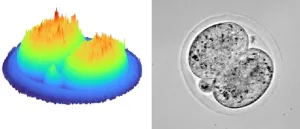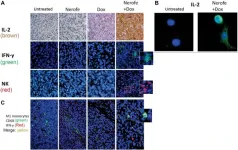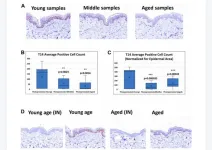(Press-News.org) Lack of sleep lessens cognitive benefits of physical activity
Regular physical activity may protect against cognitive decline as we get older, but this protective effect may be diminished for people who are not getting enough sleep, according to a new study by UCL researchers.
The study, published in The Lancet Healthy Longevity, looked at cognitive function over 10 years in 8,958 people aged 50 and over in England. The research team investigated how different combinations of sleep and physical activity habits might affect people’s cognitive function over time.
They found that people who were more physically active but had short sleeps – less than six hours on average – had faster cognitive decline overall, meaning that after 10 years their cognitive function was equivalent to peers who did less physical activity.
Lead author Dr Mikaela Bloomberg (UCL Institute of Epidemiology & Health Care) said: “Our study suggests that getting sufficient sleep may be required for us to get the full cognitive benefits of physical activity. It shows how important it is to consider sleep and physical activity together when thinking about cognitive health.
“Previous studies examining how sleep and physical activity might combine to affect cognitive function have primarily been cross-sectional – only focusing on a snapshot in time – and we were surprised that regular physical activity may not always be sufficient to counter the long-term effects of lack of sleep on cognitive health.”
The study found, in line with previous research, that sleeping between six and eight hours per night and higher levels of physical activity were linked to better cognitive function.
Those who were more physically active also had better cognitive function regardless of how long they slept at the start of the study. This changed over the 10-year period, with more physically active short sleepers (less than six hours) experiencing more rapid cognitive decline.
This rapid decline was true for those in their 50s and 60s in this group, but for older participants (aged 70 and over) the cognitive benefits of exercise appeared to be maintained, despite short sleep.
Co-author Professor Andrew Steptoe (UCL Institute of Epidemiology & Health Care) said: “It is important to identify the factors that can protect cognitive function in middle and later life as they can serve to prolong our cognitively healthy years and, for some people, delay a dementia diagnosis.
“The World Health Organisation already identifies physical activity as a way to maintain cognitive function, but interventions should also consider sleep habits to maximise long-term benefits for cognitive health.”
For the study, the researchers used data from the English Longitudinal Study of Ageing (ELSA), a nationally representative cohort study of the English population. Participants were asked how long they slept on an average weeknight and were split into three sleep groups: short (less than six hours), optimal (six to eight hours) and long (greater than eight hours).
They were also given a score based on the frequency and intensity of self-reported physical activity and divided into two groups: more physically active (the top third of scorers) and less physically active (the other two thirds). Cognitive function was assessed on the basis of an episodic memory test (asking participants to recall a 10-word list, both immediately and after a delay) and a verbal fluency test (asking participants to name as many animals as they can in a minute).
The researchers adjusted for a number of confounding factors, such as participants having done the same cognitive test before and therefore being likely to perform better. They also excluded people with self-reported dementia diagnoses and those whose test scores indicated some cognitive impairment, so that behaviour changes linked to preclinical Alzheimer’s disease (such as sleep disturbance) did not inadvertently affect the results.
In terms of study limitations, the researchers relied on participants self-reporting their sleep duration and physical activity. The next steps, the researchers said, may be to repeat the results in more diverse study populations, examine more cognitive domains and more domains of sleep quality, and use objective measures such as a wearable physical activity tracker.
The research was funded by the UK’s Economic and Social Research Council.
END
Lack of sleep lessens cognitive benefits of physical activity
Regular physical activity may protect against cognitive decline as we get older, but this protective effect may be diminished for people who are not getting enough sleep, according to a new study by UCL researchers.
2023-07-06
ELSE PRESS RELEASES FROM THIS DATE:
Amsterdam UMC led eHealth app ensures 30% faster recovery after major abdominal operations
2023-07-06
Through the use of eHealth application ikHerstel, patients recover from major abdominal operations 30% faster than patients who do not use the app. That is the main conclusion of research led by Amsterdam UMC across eleven Dutch hospitals. The app aims to empower patients to feel more in control of their recovery process. The results were published today in Lancet Digital Health.
Patients are being discharged from the hospital quicker after treatment. Where patients used to receive care, information and support in the hospital for a number of days, they are now often ...
Holograms for life: Improving IVF success
2023-07-06
In a world-first, 3D holographic images of an embryo have been developed as part of a collaborative research project between the University of Adelaide and University of St Andrews. The images are created using miniscule amounts of light in a fraction of a second.
The team, led by Dr Kylie Dunning, Hospital Research Foundation fellow from the University of Adelaide’s Robinson Research Institute, and Professor Kishan Dholakia from the University of Adelaide and the University of St Andrews, developed an approach to create 3D holographic images of the pre-clinical model of an embryo at various stages ...
Helping adolescents to feel competent and purposeful – not just happy – may improve grades
2023-07-06
Encouraging adolescents to feel capable and purposeful – rather than just happy – could improve their academic results as well as their mental health, according to new research which recommends changing how wellbeing is supported in schools.
The University of Cambridge study, involving over 600 teenagers from seven English schools, examined two separate aspects of their wellbeing: life satisfaction and ‘eudaimonia’. While life satisfaction roughly equates to how happy a person is, eudaimonia refers to how well that person feels they are functioning. It incorporates feelings of competence, motivation and self-esteem.
Researchers ...
Unlocking the mystery of long-lasting cancer treatment
2023-07-06
New insights explaining why some children have a longer remission than others after having cutting-edge CAR T-cell therapy for leukaemia have been revealed by researchers at UCL, Great Ormond Street Hospital, and the Wellcome Sanger Institute.
The collaborative research project, published today in Nature Medicine, combines expertise in novel immune therapy design and state-of-the-art computational analysis to identify a genetic signature of CAR T-cells that will be the most effective in the long term.
In recent years, CAR T-cells – genetically engineered ...
Astronomers identify the earliest strands of the cosmic web
2023-07-06
Using NASA's James Webb Space Telescope, a team of scientists led by University of Arizona astronomers has discovered a threadlike arrangement of 10 galaxies that existed just 830 million years after the Big Bang.
Lined up like pearls on an invisible string, the 3-million-light-year-long structure is anchored by a luminous quasar – a galaxy with an active, supermassive black hole at its core. The team believes the filament will eventually evolve into a massive cluster of galaxies, much like the well-known Coma Cluster in the "nearby" universe. The results are published in two papers in The Astrophysical Journal ...
Professor spreads the gospel of ‘good fire’ through eco-cultural lens
2023-07-06
LAWRENCE – A pyromaniac is someone unhealthily obsessed with the destructive power of fire. Melinda Adams instead is pulled toward the term pyromantic – a lover of “good fire” for the benefits it can bring to people, communities and the environment as a whole.
The Langston Hughes Assistant Professor in Indigenous Studies and Geography & Atmospheric Science at the University of Kansas, Adams extols the benefits of cultural or ceremonial fire in a new paper she has co-authored ...
Transformation of immunosuppressive mtKRAS tumors into immunostimulatory tumors by Nerofe and Doxorubicin
2023-07-05
“[...] we demonstrated that the combination of Nerofe and DOX exerts a synergistic effect during mCRC treatment [...]”
BUFFALO, NY- July 5, 2023 – A new research paper was published in Oncotarget's Volume 14 on July 1, 2023, entitled, “Transformation of immunosuppressive mtKRAS tumors into immunostimulatory tumors by Nerofe and Doxorubicin.”
Members of the rat sarcoma viral oncogene (RAS) subfamily KRAS are frequently mutated oncogenes in human cancers and have been identified ...
Bar-Ilan University study reveals disparity in quality of life among COVID-19 survivors from different ethnic groups
2023-07-05
A new study conducted by researchers at Bar-Ilan University in Israel has shed light on the long-term impact of COVID-19 on the quality of life among different ethnic groups in the country. The study, part of a larger cohort project, highlights a significant discrepancy between Arabs and Druze, and Jews, with the two former groups experiencing a more pronounced decline in quality of life one year after infection.
In this cohort study, researchers regularly followed up with individuals who had been infected with the SARS-CoV-2 virus to assess various aspects of their health. The findings, published in the International ...
Fossils reveal how ancient birds molted their feathers— which could help explain why ancestors of modern birds survived when all the other dinosaurs died
2023-07-05
Every bird you’ve ever seen— every robin, every pigeon, every penguin at the zoo— is a living dinosaur. Birds are the only group of dinosaurs that survived the asteroid-induced mass extinction 66 million years ago. But not all the birds alive at the time made it. Why the ancestors of modern birds lived while so many of their relatives died has been a mystery that paleontologists have been trying to solve for decades. Two new studies point to one possible factor: the differences between how modern birds and their ancient cousins molt their feathers.
Feathers are one of the key traits that all birds share. They're made of a protein called keratin, the same material ...
A novel peptide ‘T14’ reflects age and photo-aging in human skin
2023-07-05
“[...] the results suggest a possible novel approach [for] exploring skin disorders [...]”
BUFFALO, NY- July 5, 2023 – A new research paper was published in Aging (listed by MEDLINE/PubMed as "Aging (Albany NY)" and "Aging-US" by Web of Science) Volume 15, Issue 12, entitled, “A novel peptide ‘T14’ reflects age and photo-aging in human skin.”
T14 is a 14mer peptide derived from the C-terminus of acetylcholinesterase (AChE). Once cleaved, it is independently bioactive of the parent molecule and enhances calcium influx in different cell types, in a range of scenarios: it binds to an allosteric site selectively ...
LAST 30 PRESS RELEASES:
Magnetic resonance imaging opens the door to better treatments for underdiagnosed atypical Parkinsonisms
National poll finds gaps in community preparedness for teen cardiac emergencies
One strategy to block both drug-resistant bacteria and influenza: new broad-spectrum infection prevention approach validated
Survey: 3 in 4 skip physical therapy homework, stunting progress
College students who spend hours on social media are more likely to be lonely – national US study
Evidence behind intermittent fasting for weight loss fails to match hype
How AI tools like DeepSeek are transforming emotional and mental health care of Chinese youth
Study finds link between sugary drinks and anxiety in young people
Scientists show how to predict world’s deadly scorpion hotspots
ASU researchers to lead AAAS panel on water insecurity in the United States
ASU professor Anne Stone to present at AAAS Conference in Phoenix on ancient origins of modern disease
Proposals for exploring viruses and skin as the next experimental quantum frontiers share US$30,000 science award
ASU researchers showcase scalable tech solutions for older adults living alone with cognitive decline at AAAS 2026
Scientists identify smooth regional trends in fruit fly survival strategies
Antipathy toward snakes? Your parents likely talked you into that at an early age
Sylvester Cancer Tip Sheet for Feb. 2026
Online exposure to medical misinformation concentrated among older adults
Telehealth improves access to genetic services for adult survivors of childhood cancers
Outdated mortality benchmarks risk missing early signs of famine and delay recognizing mass starvation
Newly discovered bacterium converts carbon dioxide into chemicals using electricity
Flipping and reversing mini-proteins could improve disease treatment
Scientists reveal major hidden source of atmospheric nitrogen pollution in fragile lake basin
Biochar emerges as a powerful tool for soil carbon neutrality and climate mitigation
Tiny cell messengers show big promise for safer protein and gene delivery
AMS releases statement regarding the decision to rescind EPA’s 2009 Endangerment Finding
Parents’ alcohol and drug use influences their children’s consumption, research shows
Modular assembly of chiral nitrogen-bridged rings achieved by palladium-catalyzed diastereoselective and enantioselective cascade cyclization reactions
Promoting civic engagement
AMS Science Preview: Hurricane slowdown, school snow days
Deforestation in the Amazon raises the surface temperature by 3 °C during the dry season
[Press-News.org] Lack of sleep lessens cognitive benefits of physical activityRegular physical activity may protect against cognitive decline as we get older, but this protective effect may be diminished for people who are not getting enough sleep, according to a new study by UCL researchers.






